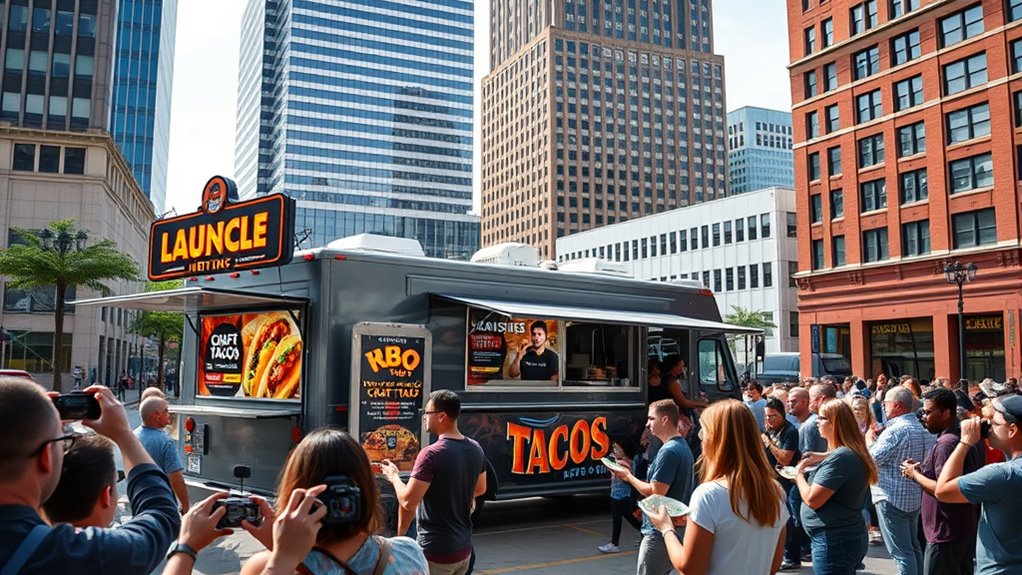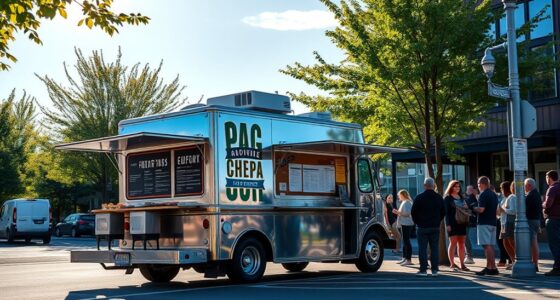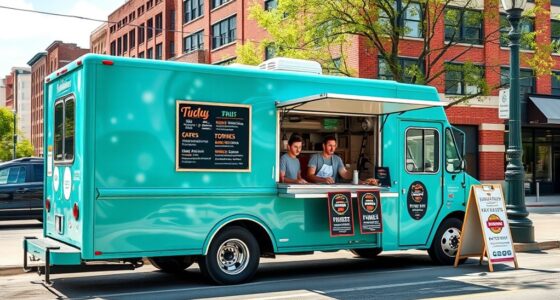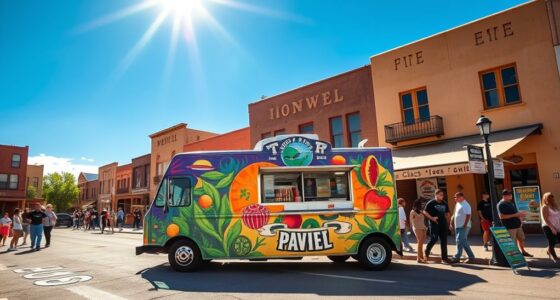To open a food truck in Kansas City, Missouri, you’ll need to secure food permits from the local health department, with costs typically starting at $315 and additional fees for temporary or mobile units. Choose busy locations like festivals, downtown areas, or partner with local vendors, ensuring you meet zoning and fire safety standards. Develop a compliant menu, and implement marketing strategies like social media and community events. Keep exploring to learn more about streamlining your launch and growing your business.
Key Takeaways
- Obtain a food permit at least 30 days before opening, with applications and fees varying by location and event type.
- Choose high-traffic areas like festivals, farmers markets, or business districts, ensuring compliance with local zoning laws.
- Develop a compliant menu using safe food handling practices and proper temperature controls to meet Missouri Food Code standards.
- Utilize social media, community events, and vendor partnerships for marketing, customer engagement, and brand visibility.
- Budget for permits, equipment, supplies, staffing, and marketing, while tracking expenses and leveraging promotions for growth.
Navigating Permit Requirements and Application Procedures
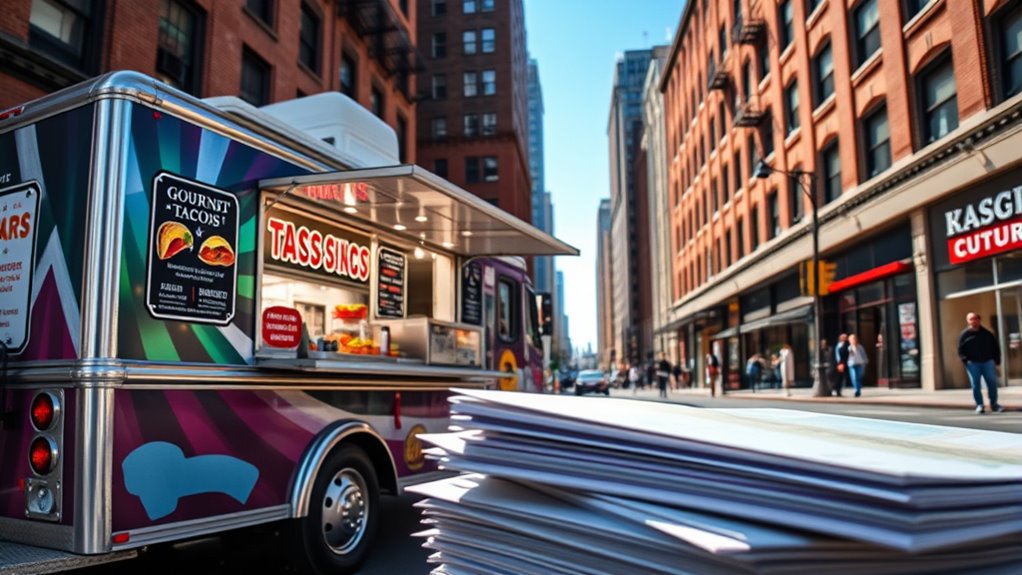
To successfully operate your food truck in Kansas City, you need to understand the permit requirements and application procedures. You must submit a completed food permit application at least 30 days before your planned opening date, sending it to the Kansas City Health Department at 2400 Troost Ave., Suite 3000. A pre-opening inspection must be scheduled before your permit is issued; however, passing the inspection doesn’t guarantee approval. If you’re in Jackson County, you also need to complete a Food Establishment or Mobile Unit Plan Review and Pre-opening Application before starting operations. For temporary food events, submit applications well in advance, as late submissions can incur extra fees. Make sure to gather all necessary forms and supporting documents to streamline the process. The application process requires a one-time fee of $315, which covers the costs of application review and inspection. Additionally, being aware of health department regulations can help prevent delays or rejections during the permit approval process.
Understanding Permit Costs and Payment Processes
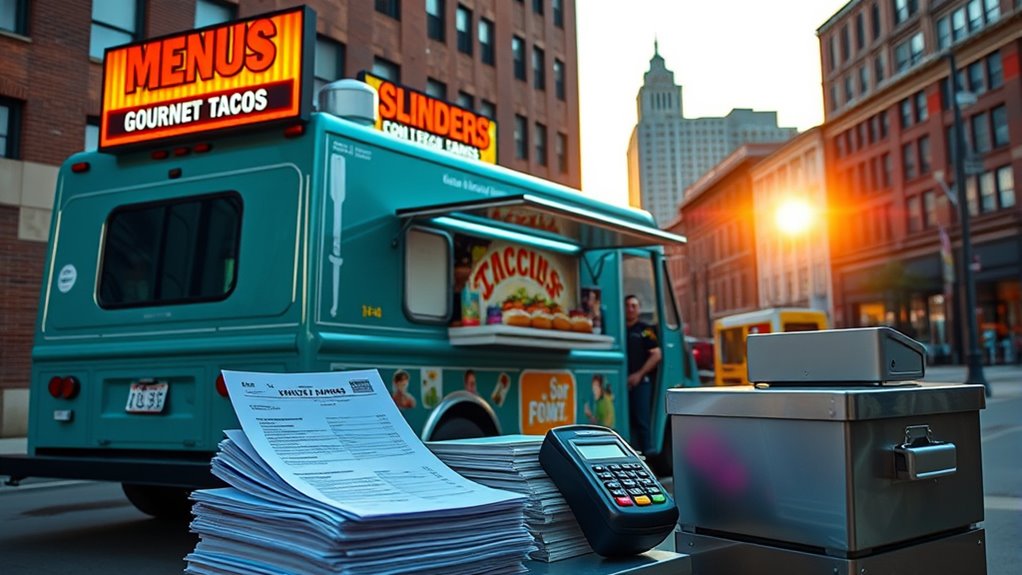
Understanding the costs associated with permits and how to pay them is essential for keeping your food truck operation on track. In Kansas City, permit fees vary depending on the type and duration. Mobile Food Unit permits are detailed in the Food Establishment Fee Schedule, while Temporary Food Permits cost $55 for up to 14 days, with each event requiring a separate permit. Non-profits can get a four-event permit for $30. Jackson County’s fees range from $460 to $775, plus a $55 late filing fee. Payment is due at pre-opening inspections and can be made by check, money order, or online through the Health Department. Payments are sent to the Kansas City Health Department or Jackson County, and supporting documents are necessary for approval. Proper permit management ensures compliance and smooth operation of your food truck.
Choosing Prime Locations and Complying With Regulations
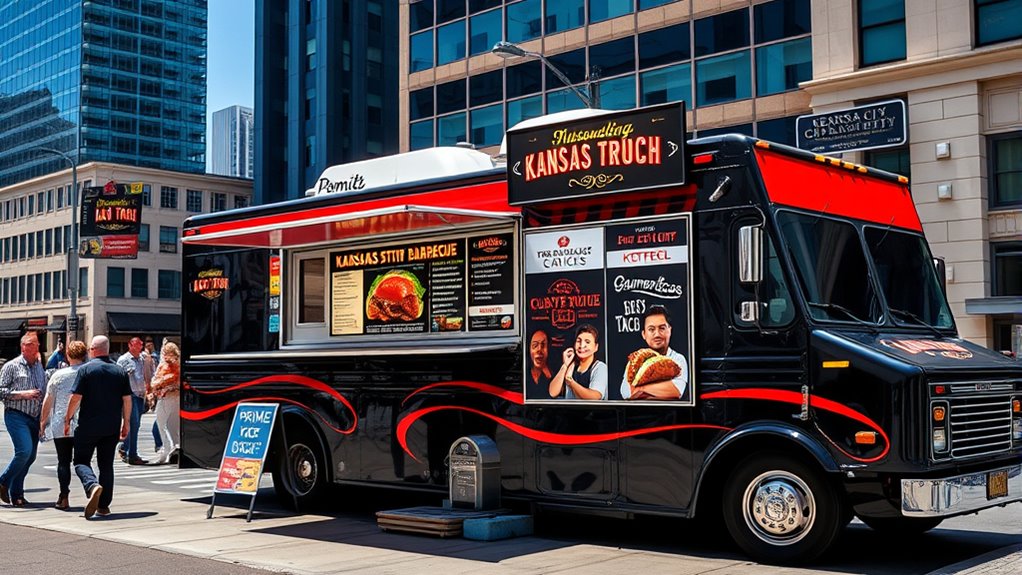
Choosing the right location is vital for your food truck’s success in Kansas City. Look for high foot traffic areas like downtown plazas, near office complexes, or entertainment districts to boost visibility and sales. Attend popular events such as festivals and farmers markets, which attract large crowds and offer temporary prime spots. Consider areas with limited food options, like business parks or industrial zones, to create niche demand. Make sure your chosen spots comply with local zoning laws and don’t block pedestrian pathways, fire lanes, or accessible zones. Coordinate with event organizers or property owners for long-term placements. Remember, securing permits from the Kansas City Health Department and passing fire safety inspections are essential for legal operation. Understanding local zoning laws and staying flexible and adhering to regulations helps maximize your truck’s success. Additionally, investing in security measures such as surveillance cameras can protect your equipment and inventory, ensuring continued operation and peace of mind.
Developing a Menu That Meets Health and Safety Standards
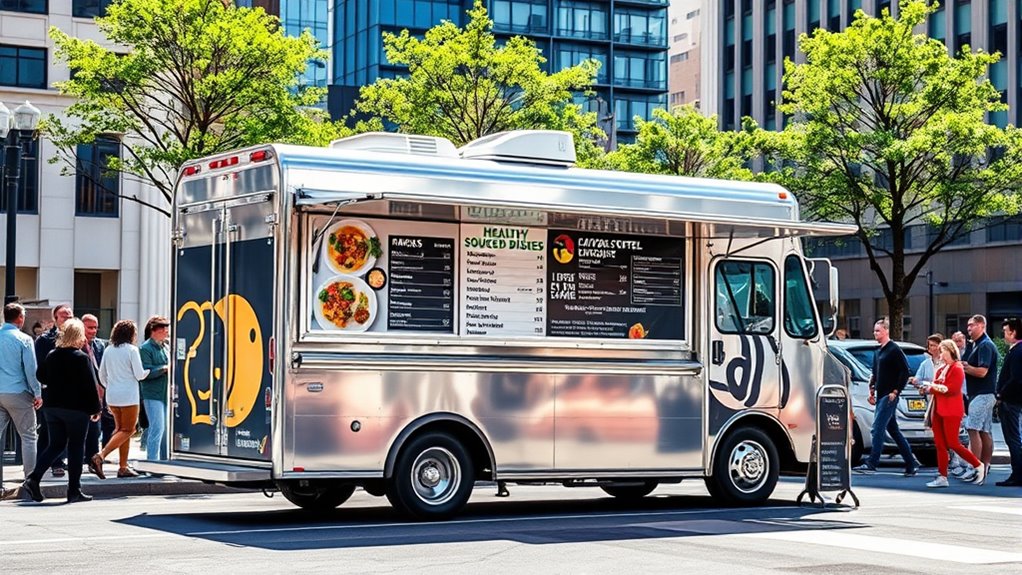
Selecting a menu that aligns with Kansas City’s health and safety standards is essential for your food truck’s success and compliance. You must guarantee all ingredients and preparation methods follow the Missouri Food Code, avoiding banned substances or unsafe practices. Proper cooking temperatures are critical—use calibrated thermometers to verify meats, seafood, and eggs reach safe thresholds, preventing foodborne illness. Store foods separately to prevent cross-contamination, and keep perishable items at correct temperatures during storage and transit. All staff should be trained in food safety, hygiene, and handling procedures, with proper documentation maintained. Inspecting mobile food vehicles ensures they meet fire safety standards and prevent hazards, which is crucial for compliance and customer safety. Menu items should be feasible within your truck’s constraints and clearly labeled for allergens. Regularly update training and documentation to meet health department standards, safeguarding your customers and your business’s reputation.
Effective Marketing Strategies to Grow Your Food Truck Business
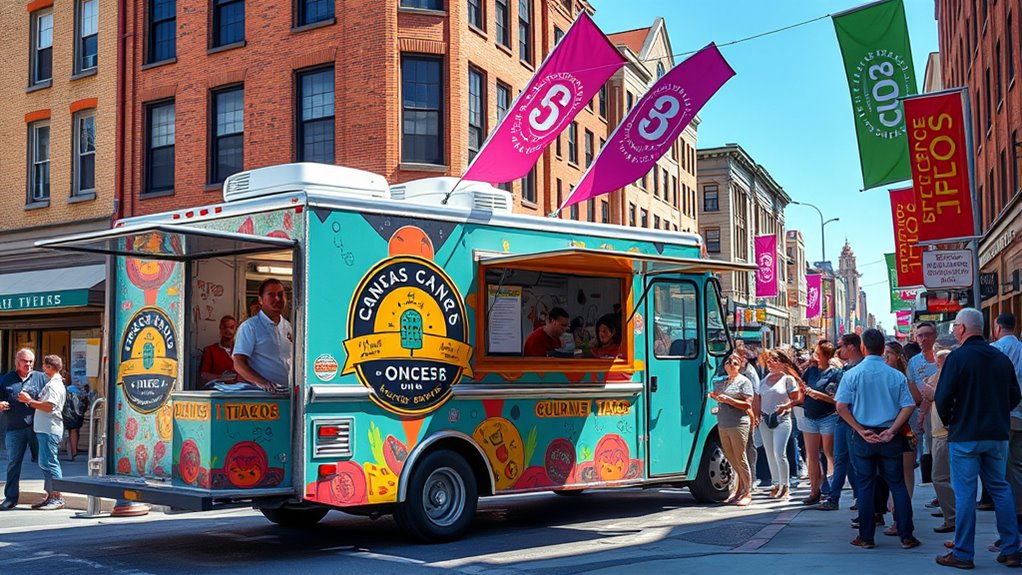
To grow your food truck business, you should focus on leveraging local events, social media, and vendor partnerships. These strategies boost visibility, attract new customers, and foster community ties. Combining these approaches will help you build a strong presence in Kansas City’s vibrant food scene. Additionally, participating in at least three festivals or events annually can increase your visibility by engaging directly with the local community and potential customers participating in at least 3 festivals or events annually to boost visibility. Incorporating top-rated marketing techniques such as targeted social media campaigns and community engagement can further elevate your brand awareness and customer base.
Leverage Local Events
Participating in local events is one of the most effective ways to boost your food truck’s visibility and attract new customers. By joining signature festivals like Fountain Fest or community celebrations such as the Turkey Creek Festival, you reach thousands of engaged attendees. These events draw diverse crowds, including families, professionals, and local residents, offering prime opportunities for brand exposure. Make sure you meet licensing, insurance, and utility requirements, and plan your menu to be family-friendly and efficient for high-volume service. Additionally, street markets and night events, like First Fridays, attract steady crowds interested in unique eats. Partnering with event organizers for cross-promotion, or offering catering services at large gatherings, can further expand your reach and strengthen your presence in Kansas City’s vibrant local scene. Event dates and participation details can vary each year, so staying informed about upcoming festivals is essential for planning your marketing strategy. Utilizing local event calendars and community boards can help you stay ahead of upcoming opportunities.
Utilize Social Media
Have you considered how social media can dramatically boost your food truck’s visibility? By creating high-quality images and engaging videos of your menu items, you’ll attract more followers. Consistent posting on platforms like Instagram, Facebook, and Twitter keeps your audience engaged and aware of your latest locations, specials, and events. Share behind-the-scenes content to personalize your brand and foster connections. Use platform-specific styles—visual posts for Instagram, event updates for Facebook, real-time location tweets. Incorporate targeted hashtags and location tags to increase discoverability locally. Respond promptly to comments and encourage user-generated content through photos and reviews. Consider paid ads on Facebook and Instagram to reach specific audiences. Utilizing trending formats like Reels and Stories can significantly increase your content’s reach and engagement. Regularly track your social media analytics to refine your strategy and grow your customer base. Additionally, integrating social media marketing into your overall branding plan can help establish a consistent and recognizable presence in the local community.
Partner With Vendors
Partnering with local vendors can substantially boost your food truck’s visibility and sales. Collaborate with bars and breweries to offer bundle deals like “beer and burger” specials, encouraging mutual foot traffic. Regular visits to these venues help build a loyal customer base, while co-branded promotions and social media collaborations strengthen marketing efforts. Participating in local events, farmers’ markets, and festivals exposes your truck to diverse crowds and enhances community ties. Partnering with complementary businesses, such as gyms or coffee shops, allows cross-promotions and shared marketing resources. Hosting or sponsoring community events, like charity drives or tasting nights, fosters goodwill and brand loyalty. Establishing loyalty programs with vendors encourages repeat visits and cross-shopping, helping your food truck grow steadily in Kansas City’s vibrant scene. Additionally, building strong vendor relationships can lead to exclusive deals and preferred placement on busy days, which can give your truck a competitive edge. Developing a clear understanding of permits and regulations ensures smooth operations and avoids potential legal issues as you expand your partnerships.
Additional Operational Tips for a Successful Launch
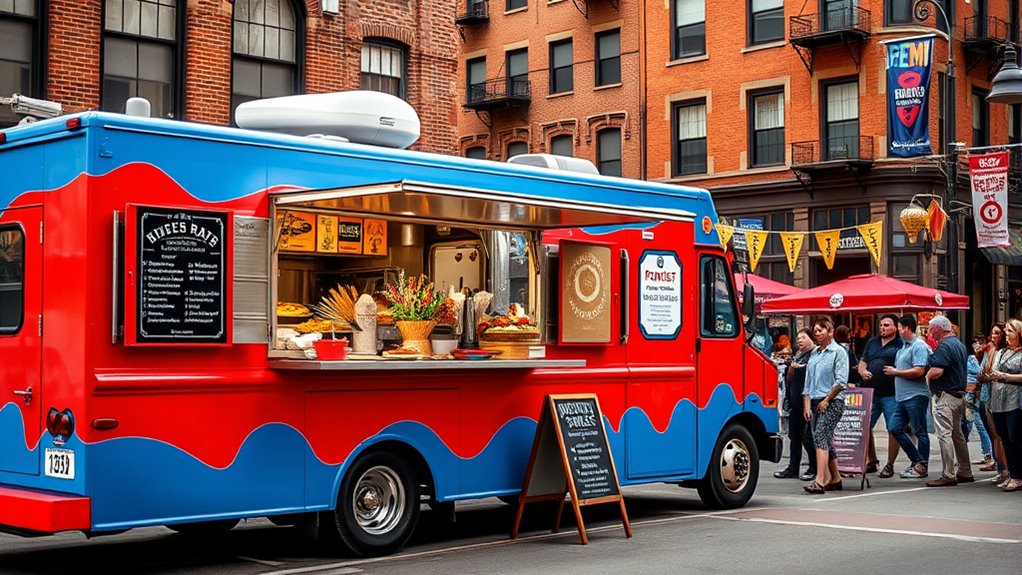
Launching a food truck successfully requires attention to detail and proactive planning. Focus on equipment maintenance by performing daily cleaning and safety checks, including fire extinguisher tests and ventilation inspections. Keep backup parts and tools onboard to address mechanical issues swiftly. Use pre-shift checklists to spot hazards early. Train staff in basic first aid and emergency procedures specific to mobile units. Manage your supply chain by building relationships with local suppliers, tracking inventory with software, and scheduling deliveries during off-peak hours. Engage customers through social media, loyalty programs, and participation in community events. Cross-train staff to handle multiple roles, and schedule shifts fairly to prevent burnout. Maintain accurate records, stay current on permits, and explore regional grants to support your successful food truck launch. Ensure compliance with Vetted regulations to avoid potential legal issues and fines.
Frequently Asked Questions
Are There Specific Zoning Laws Affecting Food Truck Placements in Kansas City?
You should know that zoning laws in Kansas City restrict where you can park and operate your food truck. You can’t park in entertainment districts like The Plaza or Power and Light, or block streets, sidewalks, and boulevards. You’re also required to keep at least 50 feet away from similar businesses during their hours. Additional permits are needed for parks, and regulations aim to prevent overcrowding and conflicts with permanent businesses.
How Do I Handle Permits for Seasonal or Special Event Operations?
When handling permits for seasonal or special event operations, you need to submit a Temporary Food Permit application for each event, ideally 30 days in advance. Make certain you pay the $55 fee, attend the mandatory inspection, and follow all health regulations. Remember, permits are non-transferable and specific to each event. Keep records, adhere to site and zoning rules, and operate only in approved areas during designated times.
What Are the Requirements for Food Truck Signage and Advertising?
You need to guarantee your signage complies with Kansas City’s regulations. Use durable, weather-resistant materials, and keep signs free of obstructing health permits or safety info. Avoid flashing or animated signs, and get approval during inspections. Your menu boards should be clear and accurate, with allergy info if needed. Place signs where they don’t block walkways or exits, and follow location-specific rules for size and placement to stay compliant.
Can I Operate Without a Commissary in Kansas City?
Imagine you want to operate a food truck in Kansas City, but without a commissary, you’re out of luck. KC ordinances require all mobile units, including push carts, to have a permitted commissary for food storage, cleaning, and water access. Skipping this step could lead to permit denial, inspections failure, or fines. To stay compliant, you must partner with a licensed commissary or explore permitted alternatives.
How Often Are Health Inspections Conducted, and What Are Common Violations?
You’re wondering how often health inspections happen and what violations are common. In Kansas City, health inspections for food trucks occur regularly, often before opening and throughout the year, with frequency depending on your operation and compliance history. Common violations include improper temperature control, sanitation issues like poor handwashing facilities, equipment maintenance problems, and missing permits. Staying vigilant and maintaining proper hygiene and safety standards helps guarantee smooth inspections.
Conclusion
Starting your food truck in Kansas City can be a rewarding venture, especially with the city’s vibrant food scene. Did you know that food trucks generate over $2.7 billion annually across the U.S.? By steering permits, choosing prime locations, crafting a standout menu, and marketing effectively, you set yourself up for success. Stay compliant, innovative, and persistent—your food truck journey could become the next big hit in this bustling city.
